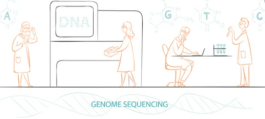
Whole genome sequencing reveals the complete DNA composition of an organism, allowing us to better understand variation within and between species. This, in turn, allows us to distinguish organisms with a precision that other technologies do not allow. All organisms have a unique genetic code or genome composed of nucleotide bases (A, T, C, and G). If you know the sequence of bases in an organism, you have identified its unique DNA pattern. Determining the order of the bases is called sequencing. Whole genome sequencing is a laboratory procedure determining the order of bases in an organism's genome in one process.
Lifeasible has a variety of platforms to perform all-around research on various phenotypic traits of mollusks at various levels such as DNA, RNA, epigenetics, etc. We also combine mass spectrometry technology to carry out research at proteome and metabolome levels, use penetrative genomics to deeply analyze the scientific problems of mollusks, and study the physiological mechanisms of mollusk evolution, disease resistance, stress resistance, reproductive development, etc. To explore the diversity of genetic resources for breeding and to lay a solid theoretical foundation for improving the mollusk breeding process.
DNA, consisting of millions of bases (A, C, T, and G), is first cut into fragments small enough to be read by a sequencer using molecular scissors.
Small pieces of DNA tags or barcodes are added to identify which segment of cut DNA belongs to which mollusk. This is like the way barcodes identify products in grocery stores.
Barcoded DNA from mollusks is combined and placed in a DNA sequencer. The sequencer identifies the A, C, T, and G or bases that make up each sequence. The sequencer uses the barcodes to track which bases belong to which mollusks.
Computer analysis tools are used to compare the sequences of mollusks and identify differences. The number of differences can tell scientists how closely related these mollusks are.
A wide range of types, such as SNP, InDel, SV, and CNV can be detected and used as molecular markers.
Capable of detecting genome-wide SNP information, as well as low-frequency SNPs.
Shorter time and lower cost.
Through continuous research and development, the sample starting volume has been reduced to the pg level.
We have rich experience in personalized analysis and can choose the most suitable analysis software according to the project’s needs, only to guarantee the most accurate results.
Strict quality control processes guarantee the accuracy of results.
We participate in the design of large projects so that the project wins at the starting line.
If you are interested in our services, or if the service you want is not listed, please feel free to contact us, and we will get back to you as soon as possible.
Lifeasible has established a one-stop service platform for plants. In addition to obtaining customized solutions for plant genetic engineering, customers can also conduct follow-up analysis and research on plants through our analysis platform. The analytical services we provide include but are not limited to the following:
Get Latest Lifeasible News and Updates Directly to Your Inbox
Adaptive Evolutionary Mechanism of Plants
February 28, 2025
Unraveling Cotton Development: Insights from Multi-Omics Studies
February 27, 2025